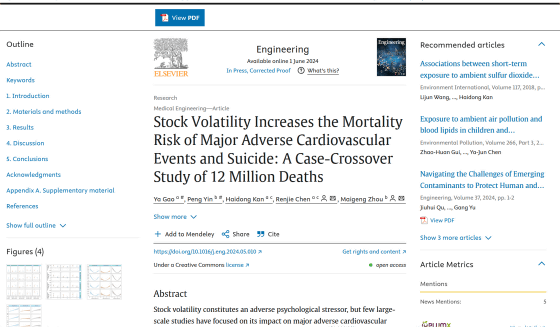Financial market fluctuations increase risk of heart attack and suicide

Stock Volatility Increases the Mortality Risk of Major Adverse Cardiovascular Events and Suicide: A Case-Crossover Study of 12 Million Deaths - ScienceDirect
https://www.sciencedirect.com/science/article/pii/S2095809924002790

Stock market volatility increases risk of heart attacks and suicide - Earth.com
https://www.earth.com/news/stock-market-volatility-increases-risk-of-heart-attacks-and-suicide/
The sudden drop in the Nikkei average on August 5th was caused by concerns over the US economic recession and the strong yen, and the drop was coupled with panic selling by panicked investors, resulting in a historic drop. In order to avoid confusion in trading, a measure called a ' circuit breaker ' was taken to temporarily halt trading of the Tokyo Stock Exchange Stock Price Index and Nikkei average futures.
Furthermore, on the following day, August 6, the stock market rebounded at once, recording a rise of more than 3,400 yen in the morning. This was a very volatile price movement, with a historic sharp rise immediately following a historic drop.
In this situation, many people are aware that stock market fluctuations have a negative impact not only financially but also mentally. A study published in June by a Chinese research team investigated the impact of stock market fluctuations on cardiovascular disease mortality and suicide rates for 12 million people who died across China between 2013 and 2019.

The analysis showed that a 1% drop in the stock index in one day was associated with a 0.74-1.04% increase in cardiovascular disease mortality and a 1.77% increase in suicide rates. This suggests that a sudden drop in stock prices not only brings about financial losses, but also causes significant damage to people's health and mental health.
Furthermore, it was found that even if the stock market index rose by 1% in one day, the mortality rate from cardiovascular disease increased by 0.57 to 0.85% and the suicide rate increased by 0.67 to 0.77%. In other words, the stock market not only has a negative effect on the mind and body when it falls, but also poses a risk to people when it rises.
Science media Earth.com commented, 'This means that managing the stress of stock market volatility is just as important as managing your investment portfolio itself,' arguing that understanding market dynamics can help mitigate the negative effects of stock market fluctuations, and that it is important to improve investors' financial literacy.

Christopher Decker, a professor of economics at the University of Nebraska at Omaha, pointed out that one of the reasons for the recent stock market crash was the US employment statistics in July, which fell short of expectations . However, he said that since January 2024, US employment statistics have exceeded expectations, so investors do not need to overreact.
Attention, jittery investors: Stop panicking … this is what a soft landing should look like
https://theconversation.com/attention-jittery-investors-stop-panicking-this-is-what-a-soft-landing-should-look-like-236180
◆ Forum is currently open
A forum related to this article has been set up on the official GIGAZINE Discord server . Anyone can post freely, so please feel free to comment! If you do not have a Discord account, please refer to the account creation procedure article to create an account!
• Discord | 'Did the stock price fluctuations have any impact?' | GIGAZINE
https://discord.com/channels/1037961069903216680/1270308825685037108
Related Posts:
in Science, , Posted by log1h_ik







